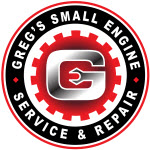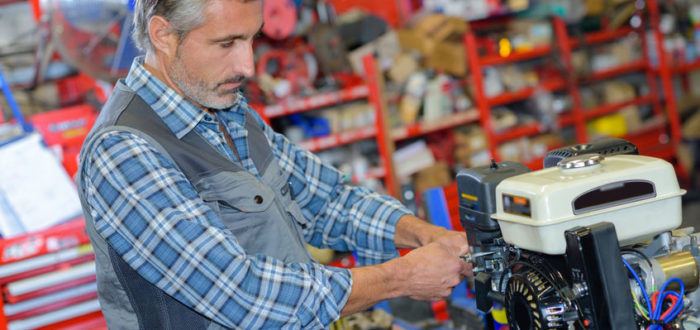Small engines include those found in lawnmowers, chainsaws, string trimmers, and other yard care equipment.
While they may be functionally similar to your car’s engine, they are not used in the same way. The unique challenges small engines face makes small engine service all the more important to keep your equipment running safely and reliably.
How are small engines different?
The engines in cars and trucks come in two basic varieties: gasoline and diesel. Diesel engines are much too heavy and complex for small engine use, so all small engines are gasoline-powered. That said, small engines also come in two varieties, but they are two completely different varieties: 4-stroke and 2-stroke.
A 4-stroke engine is like a miniature version of your car’s engine. These are found mainly on larger equipment such as lawnmowers. Smaller hand-held equipment like string trimmers and chainsaws use much simpler and lighter-weight 2-stroke engines.
Without getting too technical, the main difference between the two is that 4-stroke engines keep the lubricating oil and gasoline separate. There are complex mechanisms for doing this while also managing combustion and power.
A 2-stroke engine uses a gas/oil mixture. That allows them to eliminate a lot of heavy parts but they have their own complexity that’s different from 4-stroke engines. Additionally, since the oil goes into the ignition chamber, 2-stroke engines require a special kind of oil that provides both lubrication and easy combustion.
Both types also run at much higher speeds than larger car engines. And almost all are air-cooled while car and truck engines are almost all liquid-cooled.
What are the unique challenges small engines face?
There are many ways in which small engines are used much differently from other types of engines.
While you may drive your car practically every day, the same is almost certainly not true of your lawn and garden equipment. In many cases, it might sit unused for several months during the winter. Even in warmer months, it may regularly go a week or more between uses.
This can cause consumable products like gas, oil, and filters to deteriorate and break down. Cheaper brands of oil and gas may have additives that build up a thick, gunky residue when left sitting for long periods of time.
Sitting around unused can also allow both rust and dirt to build up on engine parts.
Speaking of dirt, although you likely drive your car primarily on paved roads, lawn and garden equipment is continuously operated in very dusty, dirty conditions. It’s inevitable that some of that dirt, grass, and other debris builds up on, and even gets inside of, small engines.
Small engines also tend to go from idle to full speed, often with little or no in between. That kind of rapid acceleration and sustained operation at full speed is brutal on engine parts!
What can be done to extend the service life of a small engine?
So small engines live a tough life, but regular small engine service can go a long way toward extending that life. Well maintained equipment can give years of reliable service.
One of the most obvious and easy things is to replace high-wear consumable items like spark plugs, oil, and filters at the start of every season. Belts and blades should be on that list as well.
Getting professional small engine service, including tune-up and cleaning, also goes a long way toward getting your equipment ready for another year of steady use.
Finally, if you encounter certain problems, such as hitting a rock with your lawnmower, get it checked out by a professional small engine service mechanic. The same goes if it suddenly becomes difficult to start or if it makes strange noises or smells.
For the best in small engine service, check out Greg’s Small Engine. Servicing small engines is all we do. As specialists, we really know our craft and can keep your equipment running its best.






















